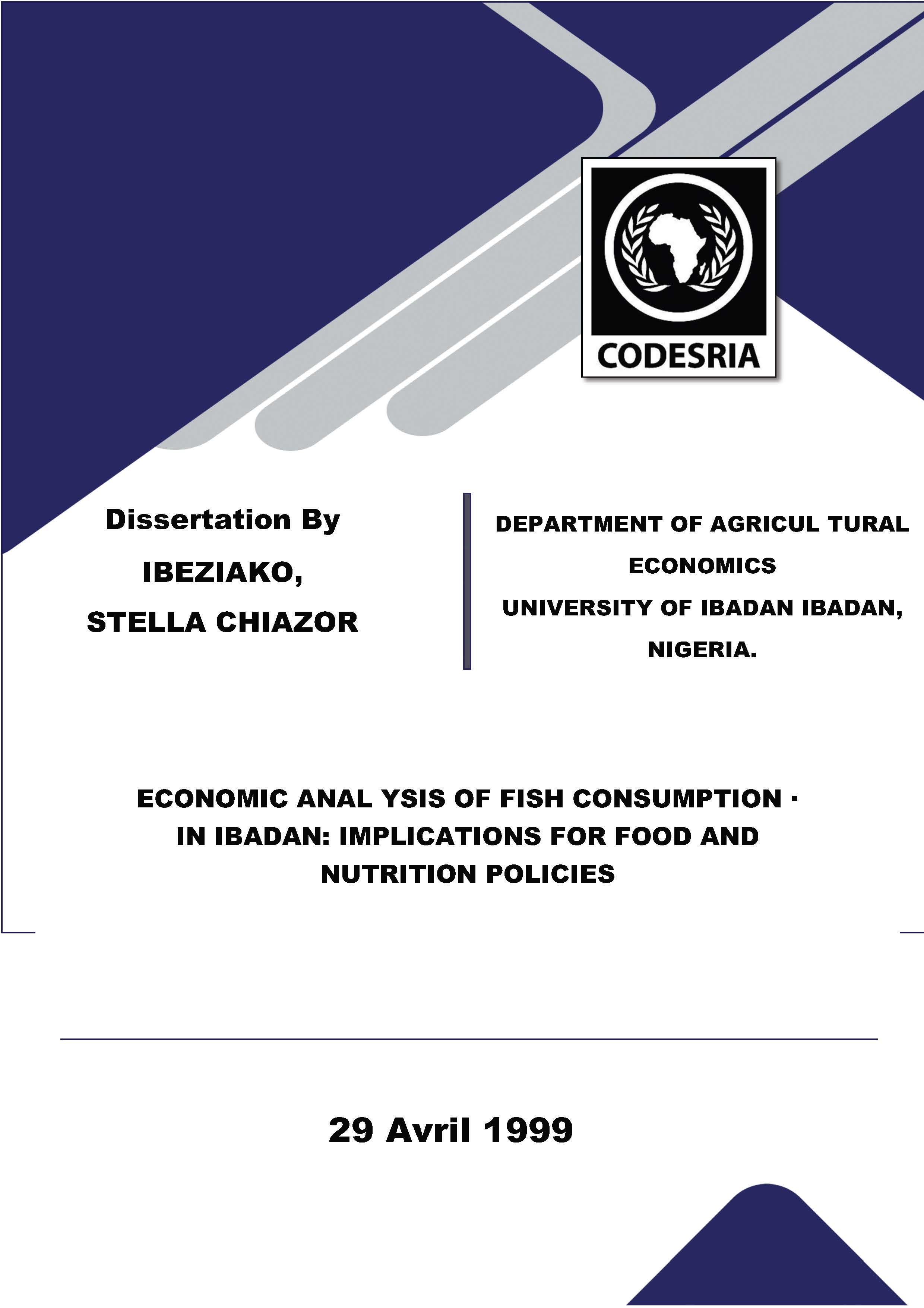ECONOMIC ANAL YSIS OF FISH CONSUMPTION · IN IBADAN: IMPLICATIONS FOR FOOD AND NUTRITION POLICIES 29 Avril
Mots-clés :
FISH CONSUMPTION, IBADAN, FOOD, NUTRITION POLICIESSynopsis
This study analyses household fish consumption in Ibadan metropolis and examines the implications for food and nutrition policies. Cross-sectianal data were collected fram 124 households in Ibadan with a view ta analysing the functianal relatianship between fish cansumptian and same socio-econamic variables of the househald. For this purpase, households were classified into low, middle and high incarne groups. The study showed that majority of households in the study area are in the low incarne class. lncome was found to be a major determinant of hausehald fish consumption expenditure, while ather factors
like household size, age, occupation, taste and level of education were secondary determinants. The study alsa reveals that the average monthly expenditure of .fish increases with increase in incarne and hausehald size. ln the regression analysis, four functional forms were fitted to the collected data in which the expanential function gave the best fit for hausehalds' fish consumption expenditure. The incarne elasticity of demand for fish was found to be 0.12122, indicating that fish is incarne inelastic and is also a necessity in the study area, while the MPC for incarne was 0.0076. Incarne was found ta be statistically significant at 1 per cent while household size and age were significant at 5 per cent. Education did not appear ta be a significant explanatory variable influencing fish consumption expenditure in this study. The findings of this study point to the need for increasing damestic fish production in the country through deliberate government efforts and the participation of the private sectors and NGOs in development plans, thereby increasing the daily per caput intake of fish.
Téléchargements
Références
Aboyade, O. (1983) Integrated Economies, A Case Study of Development Economies.. Adison Wesley, New York, pp. 515-517.
Adeniyi, J. P. (1987) Fish Consumption in Nigeria: Implications for Fisheries Development Policies. Journal of West African Fisheries Vol. Ill, No. 2, pp. 151-161.
Adesimi, A. A. and Aderinola, E. A. (1983) "Economie Analysis of Fish Import Demand in Nigeria" Proceedings of the 3rd Annual Conference of the Fisheries Society of Nigeria (FISON) pp. 159-169.
African Regional Nutrition Strategy (1993 - 2003). Council of Ministers. 58 Ordinary Sessions 21 - 26 June 1993, Cairo, Egypt.
Agary, T. (1992) Trends in Nutrition in Nigeria. Reporting on the World Nutrition Situation.
ACC/SCN Second Report on the World Nutrition Situation, Vol. 11, pp. 56-58.
Ajayi, T. O. and Adegbola, V. O. (1985). The Marine Fisheries Resources of Nigeria Potential and Development. NIOMR Technical Paper No. 21:5.
Anthonio, Q.B.O (1966): 11Food Expenditure and Incarne Relationship in Nigeria: Engel's Curve Functions11 Bulletin of Rural Economies and Society Vol. 2, No. 1.
Aquaculture Development Programme (ADP) of the Directorate of Food, Roads and Rural Infrastructures. Fish Pond Management Extension Guide No. 4. 1988.
Babalola, (1978): "Effect of income on Food Consumption Expenditure in Ado Ekiti11. An Unpublished B.Sc. Project, Dept. of Agric. Econs. University of Ibadan.
Carpe-Smith, H. (1993): "An Analysis of Household Food Consumption Pattern in Rural Areas. A Case Study of ldanre lfedore LGA.11 B.Sc. (Unpublished thesis).
Davies, C. G. (1982) Linkages Between Socio-Economic Characteristics of Food Expenditure Patterns and Nutritional Status of Low-lncome Households: A Critical Review11 American Journal of Agric. Econs. Vol. 64, No. 5.
Edeh, S. O. N. (1982) Demand for Animal Protein in lsi-Uzo LGA of Anambra Economies, University of Ibadan, Ibadan.
Mabawonku, A. F. (1989): A Structural Analysis of the Nigerian Fishery lndustry.Nig-. Journal of Agric. Sc. 4.(2) 1989.
Moses, B. S. (1983): Introduction to Tropical Fisheries, Studies in the Biology of Africa. Ibadan University Press 1983.
Nigeria Faderai Government (1980) Fourth Development Plan, 1981 - 1985. (Lagos, Government Printer).
Ojo, A. W. (1983) 11An Analysis of Consumption E penditure Patterns in Urban Cities: A Case Study of Ibadan City. Unpublished B.Sc. Project. Department of Agric. Econs, University of Ibadan, Ibadan.
Okpanefe, M. O. (1982) Demand .Analysis for Nigerian Fisheries. Proceedings of the 2nq Annual Conference FISON of the Fisheries Society of Nigeria (FISON), pp. 193-200.
Olayide, S. O., D. Olatubosun, E. O. ldosogie and ·J. D. Abiagom (1972) A Quantitative Analysis of Food Requirement: Supply and Demand in Nigeria, 1968 - 1985. F.D.A, Lagos.
Olayide, O. A. (1993): Differences in Food Consumption of Academic and Non Academic Staff in University of Ibadan. Unpublished M.Sc. Thesis, Dept. of Agric. Econs, University oflbadan, Ibadan.
Oniye S. J. and Adegboye J. D. (1986) 11Consumption Preferences for Fish in Kaduna State of Nigeria11 Paper presented at the 1986 Annual Conference of the Agricultural SociE:lty of Nigeria, ABU Zaria.
Oni, S. A. and Anthonio, Q.B.O (1971) An Empirical Analysis of Food Consumption Expenditure in Nigeria. A Case Study of Ibadan City. The Nigerian Agricultural Journal. Vol. 2 No. 1, 1971.
Osajuyigbe, O. (1981): Public lnvestment in Fisheries Development in Nigeria. M.Sc. Thesis, Department of Agric. Economies, University of Ife, lie-Ife.
Thomas, W. J. (1972): The Demand for Food" Manchester University Press pp.136.
Tabor, J. G. (1985) Review and Appraisal on Fisheries Development Efforts in Nigeria. Fison Annual Report. 1985 pp. 78.
Tabor, J. G. (1989) Status of the Nigerian Fisheries lndustry - How to Become Self Reliant. in Fish Production. Paper presented at the Faderai Ministry of Science. and Technology Monthly Seminar, Lagos 22 February 1989.
Tobor J. G. (1990) Status of Aquaculture and Fish Production in Nigeria. Paper Presented at the Symposium on 11lmproving Fish Production Through Aquaculture Practices11 at the Fauna Conservation Week, Dept. of Wildlife & Fisheries, University of Ibadan.
Umoh, G.S. (1994): Household Food Consumption and incomè distribution Pattern in Nigeria: A Case Study of Uyo Metropolis. Unpublished M.Sc. Thesis, Dept. of Agric. Econs, University of Ibadan, Ibadan.,
UNICEF, (1991}: Master Plan of Operations for the 1991 - 1995 Programmes of Cooperation. Federal Government of Nigeria and UNICEF, 1991, pp.1 38 - 139.






